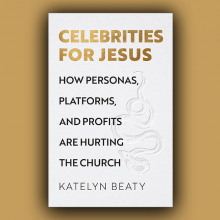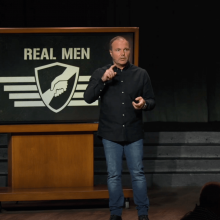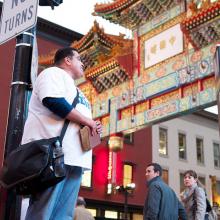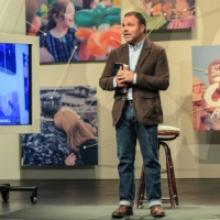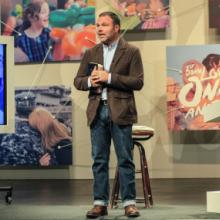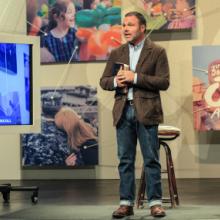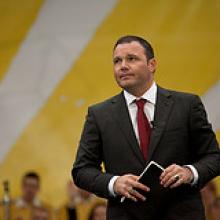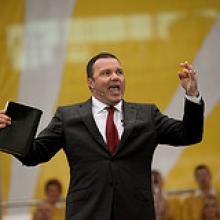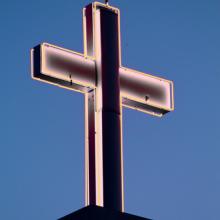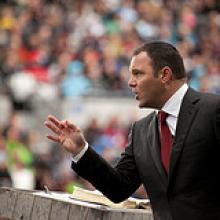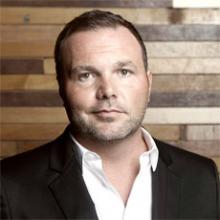mark driscoll
The outrages of celebrity culture have a material basis, with flashy sneakers and luxurious living, but Beaty’s analysis expands to include a deeper psychological and spiritual perspective on the problem.
Above all else, Luhrmann displays Elvis as a man-turned-god who was exhausted trying to make peace with his paradoxes.
It would be too reductive — and too convenient — to suggest that Driscoll’s authoritarianism was solely a product of his brash, conservative theology. Catholic, mainline, and progressive Christians are not immune. Many forms of theology are susceptible to manipulation and abuse, and many others are intrinsically harmful — even if the damage isn’t always easy to discern.
Nearly 9 percent of men in the U.S. have daily feelings of anxiety and depression, and fewer than half of those men seek help. That’s 5.5 million men who battle mental illness each day, alone. And suicide is the second leading cause of death for men aged 10-34.
A new short film from MTV, "American Male," explores how social expectations of masculinity afflict male minds — and in particular, the minds of frat guys who feel homoerotic urges they don’t know how to explain or admit. The film follows a muscular white male as he tortures himself for his shoddy beer pong skills, his feminine hand gestures, and his alternative sexuality.
The civil racketeering lawsuit against former Mars Hill Church pastor Mark Driscoll and former executive elder Sutton Turner has been dismissed before a judge had the chance to consider the case.
The reason: Neither Driscoll nor Turner ever was served with the suit, brought by four former members of the now-defunct Seattle church.

Mark Driscoll with family. Image via Mars Hill Church / RNS
Former Mars Hill Church elder Sutton Turner has filed a motion to dismiss the civil racketeering lawsuit brought against him and former pastor Mark Driscoll by four former members of the now-defunct Seattle church.
That’s because, Turner said, he never was served with the lawsuit, which the state of Washington reportedly requires within 90 days.

Mark Driscoll. Image via Mars Hill Church / RNS
Controversial former Mars Hill Church Pastor Mark Driscoll plans to launch his new church on Easter Sunday (March 27). The Trinity Church will host its first gathering that evening at the Glass and Garden Drive-In Church in Scottsdale, Ariz., it announced on its website.

Mark Driscoll. Image via Will Foster/flickr.com
A lawsuit against past leaders of the now-defunct Mars Hill Church was filed in the U.S. District Court for the Western District of Washington in Seattle on Feb. 29. The lawsuit alleges that Mark Driscoll and Sutton Turner solicited charitable contributions that were then misused for other, unauthorized purposes. The lawsuit, filed under the Racketeer Influenced and Corrupt Organizations (RICO) Act, is being brought by Brian and Connie Jacobsen and Ryan and Arica Kildea.
I was recently talking with friends about looking people up online. I told the story of being unpleasantly surprised to find, on someone’s Facebook profile, that he was affiliated with a sports-themed summer camp in the Middle East run by Christians with the not-as-subtle-as-they-think motivation of converting (or at least … influencing) young Muslim campers. As I told the story, I could see that I had probably picked the wrong audience: friends who, while they might not have signed up for such a project themselves, certainly knew people who would. I trailed off lamely, debating with myself whether to bother noting the obvious as an excuse for my reaction: that they had grown up in conservative churches and I in a liberal one.
But thinking about it later, I realized it was more than that. “I don’t believe in converting people,” I wanted to go back and say to them. “Not in the way that I don’t believe in wearing white after Labor Day — like a personal preference or moral objection — but in the way that I don’t believe in Santa Claus.” I do not believe it happens.
To be more specific, I don’t believe in people converting people. Conversion, obviously, happens. And other people may be there, even standing by and handing the convert a pamphlet. The convert may even be saying, “Because of you, I am converting!” But I don’t buy it.
For most of recorded history, Isis was an Egyptian goddess, a benevolent type who cared for widows and orphans, cured the sick and even brought the dead back to life.
This year, the world met the other ISIS.
The rise of the so-called Islamic State, variously known as ISIS or ISIL, dominated headlines in 2014 as a self-proclaimed caliphate sowed death and destruction across Iraq and Syria. For some, the group confirmed their worst fears about Muslim extremists, bent on killing religious minorities and subjugating women in a quest for domination that included leveling villages and beheading hostages.
The terror wrought by the Islamic State reflected a sense of turbulence that upended international news in 2014. But it was not the only source of unrest. The Ebola virus in west Africa put the world on edge, and a bloody war between Israelis and Palestinians in Gaza, kidnapped schoolgirls in Nigeria and the slaughter of more than 100 children at a military school in Pakistan added to the mix.
At home, America wrestled with police brutality as grand juries declined to prosecute officers in the deaths of unarmed black men in Ferguson, Mo., and New York City. From botched prison executions to a stream of desperate migrant children flooding America’s southern border, things felt troubled, disorienting, always on the verge of breaking apart.
Religion played a large role in those stories, and in other major headlines from 2014:
Mark Driscoll is back. Kind of.
The controversial founder of Mars Hill Church who stepped down last week offered a brief address at the Gateway Conference on Oct. 20. Initially, he and conference organizers agreed that he would not give a formal address at the conference.
But Robert Morris, pastor of Gateway Church in Dallas, said Driscoll requested to come to the conference as an attendee. “That was big of him to just come and be ministered to,” Morris said.
“We could crucify him, but since someone’s already been crucified for him…” he trailed off. “It’s very sad that in the church, we’re the only army that shoots at our wounded. And I’d like you to stop it.”
Driscoll’s resignation came in the wake of accusations of plagiarism, bullying and an oversized ego that alienated some of his most devoted followers.
Conference attendees gave Driscoll a standing ovation as Morris handed him the microphone.
“What do you want me to do?” Driscoll asked Morris, teasing him about the dangers of giving “a microphone to a preacher who’s been gone for a while.”
Mark Driscoll, the larger-than-life megachurch pastor who had been accused of plagiarism, bullying and an unhealthy ego, resigned from his Seattle church Oct. 15, according to a document obtained by Religion News Service.
The divisive Seattle pastor had announced his plan to step aside for at least six weeks in August while his church investigated the charges against him. Driscoll’s resignation came shortly after the church concluded its investigation.
“Recent months have proven unhealthy for our family—even physically unsafe at times—and we believe the time has now come for the elders to choose new pastoral leadership for Mars Hill,” Driscoll wrote in his resignation letter.
Driscoll was not asked to resign, according to a letter from the church’s board of overseers. “Indeed, we were surprised to receive his resignation letter,” the overseers wrote.

Paul Tripp was on the Board of Advisors and Accountability before he resigned in June. Photo courtesy of www.paultripp.com
A letter from nine Mars Hill Church pastors to their fellow elders offers the most trenchant criticism yet of controversial megachurch pastor Mark Driscoll, who recently stepped down for at least six weeks amid a series of accusations.
The pastors did not mince words in their lengthy Aug. 22 letter [full text] concerning Driscoll, who has been caught up in allegations that include plagiarism, inappropriate use of church funds, and abuse of power:
- [W]e direct that he steps down from ministry, submitting himself under the authority of the elders of the church, who will oversee the details of his restoration plan.
- He must step down not only from the pulpit, but from all aspects of ministry and leadership.
- He will continue to receive his salary so long as he continues to cooperate with the restoration plan set before him by the elders of Mars Hill Church.
The letter was posted within a Mars Hill online network and provided to Warren Throckmorton, a Grove City College psychology professor who has been blogging updates about Mars Hill.
The 4,000-word letter suggests there were insufficient layers of accountability at Mars Hill, a congregation of an estimated 14,000 people at 15 locations in five states, and that power was consolidated at the top with Driscoll given free rein to do what he wanted.
Controversial Seattle megachurch founder Mark Driscoll will step down for at least six weeks while church leaders review formal charges lodged by a group of pastors that he abused his power.
The 43-year-old pastor has been under fire in recent months for plagiarism, inappropriate use of church funds, and improper behavior toward subordinates.
Returning from vacation Sunday, Driscoll addressed Mars Hill worship services through a pre-recorded message.
“I want to say to my Mars Hill family, past and present, I’m very sorry. I genuinely mean it,” Driscoll said in his address. “I’m very sorry for the times I’ve been angry, short or insensitive. I’m very sorry for anything I’ve done to distract from our mission by inviting criticism, controversy or negative media attention.”
Driscoll said he will not do any outside speaking for the foreseeable future and postpone the publication of his next book.
The nation’s second largest Christian book retailer has pulled megachurch pastor Mark Driscoll’s books from its website and 186 stores.
Leaders at the Southern Baptist Convention’s LifeWay Christian Resources, informed stores on Friday to stop selling books by the Seattle pastor who has been in hot water.
Last week, leaders of the church planting network Acts 29 removed Driscoll and his churches from the group he helped found and asked that he “step down from ministry for an extended time and seek help.”
Driscoll has been an influential but edgy pastor within conservative evangelical circles for several years. His Mars Hill Church attracts some 14,000 people at 15 locations across five states. He has been provocative, occasionally profane, and has faced allegations of plagiarism and inflating book sales.
The mushrooming set of allegations led the publishing arm to suspend sales while it “monitors the developments of his ministry,” said LifeWay media relations manager Marty King.
“It was a cumulative effect,” King said. “The Acts 29 leadership asking him to step down was certainly a part of that.”
This week has been a rough one for Mark Driscoll, pastor of Mars Hill Church in Seattle. Following one scandal after another, the Acts 29 Network – which he helped found – removed his standing and his church’s standing within the network. They also encouraged him to step down as the leader of Mars Hill.
To add to that, Lifeway Bookstores, which is one of the biggest faith-based book chains around, decided to stop carrying all of Driscoll’s books. Basically this just means he can join me and all of us progressive Christian authors who have been edged out by Lifeway. You’ll get used to it, Mark.
All of this is good for Christianity as a whole. For starters, it demonstrates the autonomy of the Acts 29 Network from their founder. And despite their many misguided policies regarding women and their proclivity for hyper-calvinism overall, it shows that they, too, have their limits.
As for Lifeway, I can’t really tell if their decision to drop Driscoll is an ethical one, or a matter of mitigating further PR risk by having his titles in their stores. Either way, props for getting his face off the shelves, regardless.
I’d not be surprised, too, if Driscoll chooses to step down from Mars Hill in the near future. At some point, even he will recognize his leadership as untenable.
In the midst of all of this, I’m conflicted.
Controversial Mars Hill pastor Mark Driscoll has been removed from membership in Acts29, an international church planting network that Driscoll helped found. The notice to Driscoll and his church comes in the midst of rising anger from Mars Hill parishioners over revelations of Driscoll's unethical conduct, which include using church funds to boost sales of his book Real Marriage to bestseller lists and using a pseudonym to publish vulgar and sexist commentary to his church forum.
"In response, we leaned on the Mars Hill Board of Advisors & Accountability to take the lead in dealing with this matter," says the letter from Acts29, which also removed Driscoll's church from membership.
"But we no longer believe the BoAA is able to execute the plan of reconciliation originally laid out. Ample time has been given for repentance, change, and restitution, with none forthcoming. We now have to take another course of action."
"Based on the totality of the circumstances, we are now asking you to please step down from ministry for an extended time and seek help. Consequently, we also feel that we have no alternative but to remove you and Mars Hill from membership in Acts 29."
Read more here.
Well, we’ve just concluded another week in American evangelicalism. Which is to say, we’ve witnessed another Mark Driscoll blunder.
This has for sure been a rough year for the Seattle-based mega-church preacher. He was accused of plagiarizing in multiple books, which resulted in a tepid but public apology. He embarrassed himself by crashing a conference hosted by another pastor, John MacArthur. And former staff and church members spoke out about the oppressive environment at Driscoll’s Mars Hill Church. These gaffes join a legion of others. After the flood of criticism he received, Driscoll quit social media and has retreated from the public eye.
But another shoe dropped last week when Christian author Matthew Paul Turner posted a series of discussion board comments by Driscoll under the alias “William Wallace II” in 2000. Driscoll’s opinions, though 14 years old, were nothing short of vile. In addition to being expletive-laden, they were misogynistic and homophobic (and I do not use either term lightly).
In response to the furor his comments created, Pastor Driscoll apologized yet again, saying his statements were “plain wrong” and he “remains embarrassed” by them. His apology was predictably rejected by the growing gaggle of Driscoll critics, a group that has become evermore vampirical in their thirst for Driscoll’s blood. But I accept Driscoll’s apology and other Christians should too.
Christianity consists of thousands of tribes, cliques, and communities — each with different theologies, traditions, and doctrinal beliefs. Within a Westernized society obsessed with celebrity, entertainment, popularity, conflict, and money, it can be easy for Christian groups and communities to clash with each other.
For the modern church, much of its recent legacy has involved conflict, division, and controversy. Christians have developed a love-hate relationship with theologians, pastors, and church leaders — and it’s dividing the church.
Many Christians see their faith journeys as series of either/or situations and decisions — this is bad. Because as much as we want things to be clear, concise, and black-and-white, reality is complex and messy.
Pride, greed, hatred, bitterness, fear, and ignorance often cause Christians to promote distrust instead of unity — but what if Christians were more patient, graceful, and forgiving of each other?
Seattle megachurch pastor Mark Driscoll has written a letter to his congregation to explain recent controversies, including the marketing campaign intended to place the book, Real Marriage, on The New York Times best-seller list.
In recent months, however, reports have emerged that Driscoll plagiarized some of the material in his books. And earlier this month, World magazine reported that Driscoll hired a firm to buy copies of the book he penned with his wife, Grace, so that it would top the best-seller lists.
In a letter posted on Reddit on Saturday, Driscoll apologized for using the marketing strategy.
